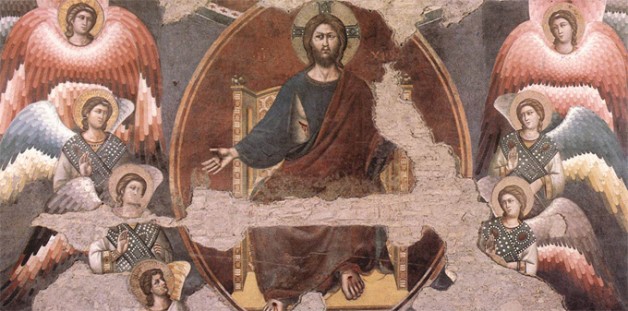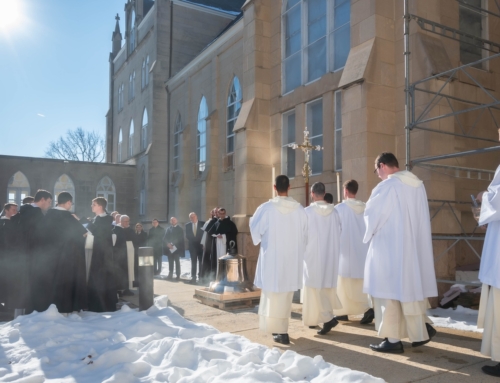When I was in college I was invited to attend an Armenian divine liturgy. While the whole celebration of the rite in the classical Armenian language was beautiful, there are only three words that I distinctly remember from that liturgy – or rather the same word said three times: “Sorph, Sorph, Sorph!”
Whether it is the Armenian Sorph, the Greek hagios, or the Latin Sanctus, Christian liturgies around the world have derived their prayer of “Holy, Holy, Holy” from the sixth chapter of the Book of Isaiah. In one of his visions, the prophet Isaiah is confronted by the Lord, whom Isaiah sees in a temple, high and lifted up upon a throne (Is 6:3). Above the Lord are six-winged seraphim, or angels, calling to one another and saying:
“Holy, Holy, Holy LORD of hosts; the whole earth is full of his glory!”
This angelic prayer can be found as early as the 4th century in the liturgies of Alexandria and Jerusalem, mentioned by Athanasius and Cyril, bishops respectively of those cities. The Roman Rite translated its Sanctus into English for liturgical use in 1974. After a series of editions, a new translation of the Roman missal is scheduled to be used this coming Advent 2011, although parts of the ordinary – such as the Sanctus – have been allowed for use since the start of September 2011. English speaking parishes are now given a noticeably different translation of the Sanctus. Below are both the current and new English translations, along with the Latin text of the Sanctus.
Current
Holy, holy, holy Lord, God of power and might,
Heaven and earth are full of your glory.
New 2011
Holy, Holy, Holy Lord God of hosts.
Heaven and earth are full of your glory.
Latin
Sanctus, Sanctus, Sanctus Dominus Deus Sabaoth.
Pleni sunt caeli et terra gloria tua.
The first difference between the two translations is the change from God of power and might to God of hosts. A host, or tsavah in Hebrew, is literally a war-wager or a guardian (Is. 40:2, Zech. 9:8). In tradition it typically refers to the angels of God that fight against Satan and the powers of darkness. In the New Testament Luke uses a “host” to describe the multitude of the heavenly army (Gk. stratia) that surrounds the shepherds in the nativity narrative of Christ (Lk. 2:13).
The use of hosts, therefore, makes direct mention of the angels that surround God in Isaiah’s vision. The term hosts is fitting not only to describe the multitude of angelic warriors that surround God, but it also echoes the prayer of the priest in the liturgy, who, just before the Sanctus is sung, exclaims “And so, with the Angels and all the Saints we declare your glory, as with one voice we acclaim” (Eucharistic Prayer II, 2011).
In the current translation, the use of power and might may have some relation to the Revelation of John where the four living creatures unceasingly sing “Holy, Holy, Holy Lord God Almighty” (pantokrator, lit. omnipotent, Rev. 4:8). This verse is an interesting comparison to Isaiah, but it is not the basis of the Latin Sanctus from which we have our English translation.
Secondly, the structure of the phrase is different. The comma is gone between the last holy and Lord and so the phrase is now one continuous address. Instead of a descriptive sentence about God (i.e. that He is holy), there is an exclamation of His full name spoken by the angels to one another: Holy-Holy-Holy-Lord-God-of-Hosts. The capitalization of each Holy in the new translation emphasizes this point of an exclamation of the Lord’s name, rather than a sentence describing God.
In the heavenly liturgy that we find described in Isaiah’s vision as well as in the Book of Revelation, the true temple is the Lord Himself, and, with the glory of God, it is Christ the Lamb who illumines this liturgy of eternal praise (Rev. 21:23). May we who participate in the Church’s liturgy here on earth be raised up and join in this angelic praise of God; and may the earth along with the heavens be filled with His glory.
Image: Pietro Cavallini, Last Judgment







